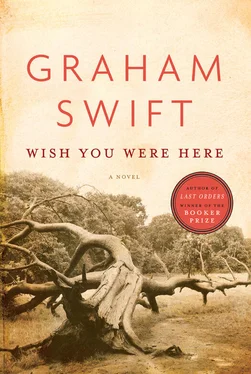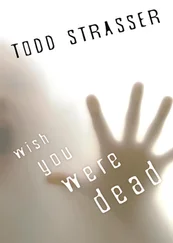Temporary arrowed signs indicated ‘Ceremony of Repatriation’. Among other things he’d been sent by Major Richards was a ‘Visitor Pack’, with a map, directions and a check list. There was also an ‘Order of Ceremony’ and a ‘Provisional List of Those in Attendance’. It had all amounted to too much to carry on his person, and he’d shoved the bulk of it in the side pocket of his holdall, thinking even then that it was not unlike the wad of stuff you take with you, along with your passport, through Departures. But, of course, his business now was the seemingly much simpler (and usually paperwork-free) business for which, in fact, Jack had never entered an air terminal before: the business of Arrivals.
I’m here to meet my brother.
The sudden proximity of it, the realisation that he would have to do this incontestably personal thing, but in these heartlessly impersonal surroundings, hit him like some actual collision — even as he drove at a careful five miles an hour, peering hard through the windscreen for further signs.
He found what seemed to be the appropriate car park. Despite his fear of being early, it was now nearly a quarter past eleven. The final miles of the journey had been along the slowest roads and he’d cut it, in the end (though he wasn’t entirely sorry), a little fine. The car park was almost full and he had to search for a space. People — some in remarkable costumes — were converging from it towards an ordinary glass-doored entrance nearby, but as if they might be approaching a cathedral. This clearly wasn’t some small event. But of course it wasn’t.
After switching off the engine he lingered in the safety of the car, as though some desperate, final choice still remained open to him. Then he took several deep, involuntary, labouring breaths and with each one said aloud, hoarsely, ‘Tom.’ Then — he wasn’t sure if he said it aloud too, in a different tone, or simply thought the word: ‘Ellie. Ellie.’
He eyed himself in the driving mirror, smoothed his hair, fingered his tie for the hundredth time. At Control of Entry he had already put on his jacket. Such documents as he thought he might still need were in its inside pockets. Official invitation. Order of Ceremony. Passport (you never knew). The letter from Babbages. In another pocket was his silenced mobile phone. But he was hardly going to activate it now.
From his shirt pocket he took the medal, warm to his touch, and slipped it into the empty breast pocket of his jacket. He could not have said why. So it would be closer to Tom. Then he got out of the car and locked it.
From then on Jack was like a puppet, a lost man, somehow steering himself or letting himself be steered through what lay before him. He might have used, if it had been one of his words, the word ‘autopilot’. He might have had the same sense of not being himself if he had been called to Buckingham Palace to be knighted by the Queen.
Beyond the glass doors (a sign said ‘Ceremony Reception’) he was met — and ticked off a list — with an intenser version of the courtesy he’d received at Control of Entry, but with also, he couldn’t help but detect, a faint, disguised relief.
I am Jack Luxton.
There was now ahead of him, through another wide doorway, a throng — he was somehow sucked into it — that included a great many uniforms, some of them of an astonishingly resplendent and seemingly high-ranking nature. His plain suit felt instantly shabby. There were swords, sashes, gold braid — medals — epaulettes. It was fancy dress. Some of the uniforms were so besmothered and encrusted that Jack wondered if they didn’t mark the point where they mysteriously merged with the regalia of dukes and earls. And he’d previously noted, from the List of Those in Attendance, that he would indeed be in the presence of one viscount (whatever a viscount was) and more than one lord. It hadn’t given him any sense of privilege. It had scared him.
Among the uniforms were a number of women in what seemed to Jack extravagant forms of dress and hat, as if this might be a wedding, and wearing also, in some cases, a kind of smile that wasn’t a smile at all and reminded him of zip fasteners. There were also at least two men wearing uniform but with long white lacy surplices on top.
Among it all too, though somehow distinct from it, were two clusters of civilians (that word, like ‘citizen’, now also forced itself upon him) who seemed to Jack not so unlike himself, either in their clothing or in their air of dazed incomprehension. He instantly knew who they were and instinctively felt it would be good, though also difficult, to be close to them. The two clusters were quite large, both consisting of more than one generation, from grandparents down to small children. In one case there was a child so small that it needed to be carried in its mother’s arms. The mother looked not only weighed down, but as if she were standing on ground that had given way. All the children looked as if they were there by mistake.
This was all suddenly quite terrible: these people, these floundering women (he vaguely grasped that the ones with the hats and smiles must be there to provide some token balance), these children, among all these uniforms. The two clusters seemed both to cling to themselves and to cling, separate as they were, to each other, and Jack realised that he was a third cluster. He was the third cluster, a cluster of one. He felt both a solidarity and a dreadful, shaming isolation, that his cluster was just him.
But at the same time he’d glimpsed something else distinct from the gathering — standing at a distance from it, yet overshadowing it, overshadowing even these important human clusters. On the far side of the large room was a wall of mainly glass, such as you might find near a boarding gate in any airport building. And through the glass, beyond the jostle of heads and hats, could be seen, out on the tarmac, a single large plane. Around it was none of the usual clutter of baggage carts and service vehicles that surrounds a parked plane at an airport, and it was stationed with its nose pointing outwards so that, even from where he was, Jack could see the dark opening into its belly, beneath the tail, and the ramp leading down.
When he’d first had to picture this event, Jack had vaguely supposed that everyone might watch the plane fly in, then unload. But of course it wouldn’t necessarily be like that. The plane had been there perhaps for some time, while preparations were made. It had landed in darkness, possibly. It had slipped over the English coast, perhaps, even as he’d slipped down Beacon Hill.
Jack had known it would be there. But seeing it like this was nonetheless a shock. It was a big plane, for three coffins. It stood there, seemingly unattended, under a dappled, grey-and-white, autumnal sky in Oxfordshire. It must have stood not so long ago on a tarmac in Iraq.
Major Richards was suddenly and mercifully at his side — barely recognised at first, since, though Jack had only ever seen him in uniform, he too now wore a sword and a sash, as if he might recently have undergone (though he hadn’t) some promotion. Even as this contact was made — an actual, quick touch on his elbow — Jack realised that Major Richards must have been keeping an eye out for him, not just to make sure he was there, but, as it now seemed, to compensate, so far as was possible, for Jack’s being just a cluster of one. He and Major Richards, if only temporarily and for the purposes of negotiating this gathering, would form a cluster of two.
Major Richards already knew that Jack was the last of the Luxtons, the only one left. There was a whole story there perhaps, he’d thought, though it was not his business to enquire. But then, only yesterday, Jack had got in touch by phone to explain that, ‘as things had turned out’, he’d be coming alone. There was a whole story there too, no doubt, but Major Richards felt it would be even less appropriate to pursue the point. His own wife wasn’t here either (though why should she be? She wouldn’t want to be). He was only a major, after all.
Читать дальше








![Питер Джеймс - Wish You Were Dead [story]](/books/430350/piter-dzhejms-wish-you-were-dead-story-thumb.webp)



